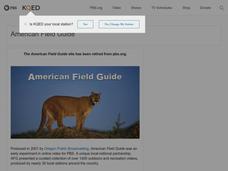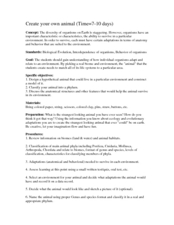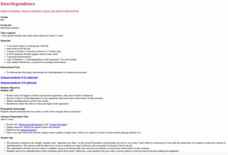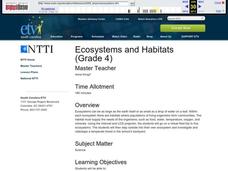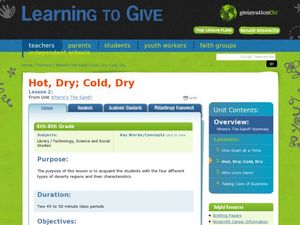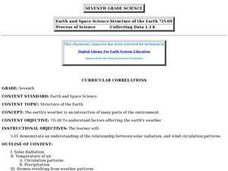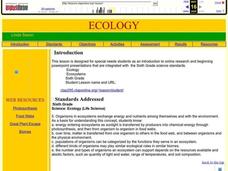Curated OER
The Salt Water Connection
Students investigate the various factors that influence the Pacific Ocean and Monterey Bay, California. They watch a video about Monterey Bay and take notes, and conduct research and write a report about a specific organism living in...
Curated OER
The Formation and Value of Temperate Grasslands
Students get an overview of the climate and organisms of the North American Prairie. After a lecture, and watching some videos imbedded in this plan, students compile research data on the North American Prairie.
Curated OER
I See a Coyote
Students role-play coyotes looking for natural resources. In this natural resources instructional activity, students examine the relationship between animal life and the environment. Students play a game that demonstrates how natural...
Curated OER
Deadly Deserts
In this reading comprehension worksheet, students read a passage regarding different deserts and answer 10 questions. The questions are a mix of true/false, short answer, and matching.
Curated OER
A Day in the Life of a San Francisco Native Animal
Young scholars write from an animal's perspective. In this writing lesson students explore the landscape of San Francisco prior to the arrival of the explorers. Young scholars research animals indigenous to the area.
Curated OER
Alphabetical Autobiography PowerPoint
Sixth graders produce an autobiography, They complete a PowerPoint including one graphic image on each slide, and a subtle or moderate animation. They include 26 slides for each letter of the alphabet, use note pages to present...
Curated OER
Ecosystems Connect
Students investigate ecosystems near their school and across the world. They examine both living (biotic) and non-living (abiotic) elements of each. They recognize ecosystems from various continents around the globe. The use of computers...
Curated OER
Biosphere
Students examine the basic biosphere and its components. In this ecology lesson students complete several experiments including designing a system that is balanced to sustain life.
Curated OER
Create Your Own Animal
Students design and create their own hypothetical animal. In this biology lesson, students identify the factors organisms need to survive. They classify their animals according to its correct phylum.
Curated OER
Interdependence: Discovering What Makes a Balanced Ecosystem
Students demonstrate that plants and animals are interdependent in a balanced ecosystem.
Curated OER
Extreme Climate
Middle schoolers discuss global warming, greenhouse effect, permafrost and other key words. In this climate lesson students create a web that connects global warming, the Arctic and world climate then write a paragraph explaining the...
Curated OER
Ecosystems and Habitats
Fourth graders go on a virtual field trip to five ecosystems. They investigate and videotape a temperate forest in the school's backyard.
Curated OER
Overpopulation
Students examine population growth and how it impacts our environment. In this population lesson plan students identify the causes and consequences of overpopulation.
Curated OER
Animals of the African Savannahs
Students create and describe a new animal that live on the savannah following the characteristics of savannah wildlife discussed in the activity.
Curated OER
Desert Animals
Students survive within an ecosystem, an animal must be physically and behaviorally adapted to the conditions of its environment.
Curated OER
Structure of Earth
Seventh graders study and make a model of the significant formations of the ocean floor. They examine images and illustration and apply their imagination while creating the model. They are challenged to complete further research as an...
Curated OER
Where's the Sand?
Middle schoolers identify the characteristics of deserts. In this geography lesson plan, students discuss the characteristics of a desert and label a map with the names of deserts.
Curated OER
The Living Environment
Fourth graders make a chart of animals and plants that live in either the desert, the ocean, or the tundra. In this environment lesson plan, 4th graders work in groups to discover characteristics needed for these animals to live in that...
Curated OER
Africa: Animals of the African Savannahs
Pupils explore animals of the savannah. In this science instructional activity, students discuss the characteristics of animals that live on the savannah. Pupils create an animal that would be able to live on the savannah.
Curated OER
Earth's Weather
Seventh graders learn how solar radiation, latitude, and other factors affect weather. They break into six groups and are assigned a topic to research and to present their findings orally.
Curated OER
Ecology
Sixth graders are introduced to online research and beginning PowerPoint presentations that are integrated. They pass a plant and photosynthesis. Students locate information on a self selected animal online. They give a PowerPoint...
Curated OER
Ecology: Symbiosis
Eighth graders identify various types of symbiotic relationships. In this ecology activity, 8th graders predict whether certain organisms can form symbiosis with other organisms. They discuss and defend their reasoning.
Curated OER
Native Plant Restoration Project
Students distinguish between exotic and native plant species. They work in groups in the field to restore a natural habitat. A class map is created to reflect their work in the field.
Curated OER
Sand, Sand, Everywhere Sand
Students study the physical characteristics of four types of desert regions. In this desert regions lesson, students watch a video about deserts and discuss the deserts. Students compare the deserts and research the ways humans have...
Other popular searches
- Land and Water Biomes
- Worksheets on Water Biomes
- Water Biomes Create Own
- Standing Water Biomes
- Water Biomes Worksheets
- What Are Water Biomes
- Estuary Water Biomes
- Examples of Water Biomes



